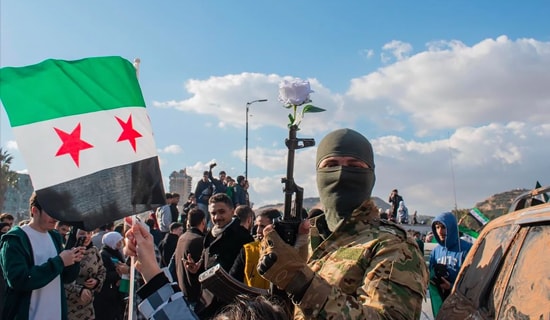Qatar's Islamic Education school textbooks for grades 6, 8, 9 and 12 deal extensively with the Islamic ethos of jihad and martyrdom. The books present jihad as the factor that led to the victories of Islam during its early history, as proof of true piety on the part of the Muslim, and as an honorable act that the Prophet's Companions aspired to with all their hearts – so much so that they were devastated if prevented from engaging in it. Moreover, jihad and martyrdom are presented as noble acts of sacrifice decreed by Allah, which entitle the believer to special rewards and a place in the highest level of Paradise.
The material is accompanied by questions and exercises in which the students are required to elaborate on the importance of jihad for the individual and society and memorize Quranic verses encouraging jihad and martyrdom.
Chapter I reviews the indoctrination of these values in the Qatari Islamic Education textbooks for the aforementioned grades.
Grade 6 Textbook: Allah Commanded The Muslims To Wage Jihad, Including By Sacrificing One's Soul
The topic of jihad is studied already in grade 6. A chapter in the Religious Education textbook for this grade is devoted to the Battle of Badr (624), in which the Muslims defeated the Quraysh Tribe. It states that this was Muhammad's first battle against the Quraysh Tribe, which occurred after Allah permitted him to wage jihad against this tribe's oppression and in defense of Islam, and that Allah granted the Muslims victory over their enemies, who outnumbered them.[3]
The chapter begins with a list of the topics to be covered, the first two being "the significance of jihad for the sake of Allah" and "types of jihad."

The first page of the chapter on the Battle of Badr
The chapter presents jihad as a virtuous act decreed by Allah, aimed at attaining peace and justice in the world, in contrast to other types of aggression which are acts of oppression. "Jihad for the sake of Allah" is defined as "doing everything one can in order to repel the enemy with one's hand [i.e., through action], tongue [i.e., with words] or money, so as to exalt the word of Allah the Almighty. Jihad in Islam is aimed at attaining justice and peace throughout the world. Allah commanded us to 'wage jihad for Allah as due to Him' [Quran 22:78]. Aggression, on the other hand, means oppressing people in word, deed or by other means, and Allah has forbidden us to do this..."[4]

The definition of jihad
Following the definition, the chapter elaborates on the different kinds of jihad, including "jihad of the soul, namely taking part in war against the infidels, for the Prophet fought the infidels and the polytheists." It adds that, "after Allah permitted [Muhammad] to wage jihad, the Messanger of Allah led 27 [military] raids..." [5]

"One kind of jihad [is] jihad of the soul"
Grade 8 Textbook Addresses Quranic Surah On The Rewards Of Jihad
The importance of jihad for the sake of Allah is stressed further in the Islamic Education textbook for grade 8, which presents it as an act of sacrifice that confers an advantage with Allah and is rewarded more than any other act. The first part of the book, focusing on reading and understanding the Quran, includes a section on Surah 61, which, the book states, "stresses that Allah will give Islam victory over all other [religions and beliefs]" and "encourages the believers to support Allah's religion and wage jihad for his sake." The section quotes the first nine verses of the Surah, including verse 4, which states:" Indeed, Allah loves those who fight in His cause in a row as though they are a [single] structure joined firmly."[6]

Verses from Surah 61
The chapter goes on to exlain why the jihad fighters are likened to "a structure joined firmly", saying: "Allah clarifies whom he loves: people who fight hard to elevate his religion, to the extent that their determination, unity and true [faith] make them like a solid structure that nobody can breach."[7] The chapter's conclusion lists the lessons to be learned from the verses, one of which is "the prefered [status] of those who wage jihad for the sake of Allah."

One of "the lessons to be taken from the verses" is "the prefered [status]of those who wage jihad for the sake of Allah."
A chapter on the Quran in the second part of the book addresses the rest of Surah 61 (verses 10-14). These verses explicitly exhort the Muslims to wage jihad for the sake of Allah with their wealth and their lives, and promises that those who do so will be absolved of all sin and attain a place in Paradise. The verses say: "O you who have believed, shall I guide you to a transaction that will save you from a painful punishment? [It is that] you believe in Allah and His Messenger and wage jihad in the cause of Allah with your wealth and your lives. That is best for you, if you should know. He will forgive for you your sins and admit you to gardens beneath which rivers flow and pleasant dwellings in gardens of perpetual residence. That is the great prize."[8]

Surah 61 verses 11-14
The next section explains the verses: "Since Allah clarified that the polytheists wish to extinguish His light, he commanded the believers to fight the enemies of Islam and urged them to sacrifice their wealth and their lives and wage jihad for the sake of Allah the Almighty. He explained to them that this is a worthwhile transaction for whoever seeks happiness in both worlds [this world and the hereafter]." It goes on to explain that whoever believes in Allah and wages jihad for His sake will be spared painful torments, which is the best transaction that can be made in this world. Furthermore, those who wage jihad for the sake of Allah will be absolved of all sin and granted a place in Paradise, and will also be granted a speedy victory.[9]

"[Allah] urged [the believers] to sacrifice their wealth and their lives and wage jihad for the sake of Allah the Almighty. He explained to them that this is a worthwhile transaction "
This is followed by questions and excercises dealing with the importance and the rewards of jihad, including a question on how jihad "benefits the individual and society"; a chart in which the students must list the rewards of the jihad fighter, while distinguishing the immediate rewards from the future ones, and another chart in which the student is required to explain the nature of the "worthwhile transaction." [10]

"Think and infer from the verse: How does jihad benefit the individual and society?"
The last part of the chapter states that among the lessons to be derived from the verses is that "the belief in Allah and jihad for His sake are a worthwhile transaction for the believers," and also that "the defered benefit of jihad is the forgiveness of sins, while its immediate result is victory over the enemies." [11]
The Aims Of Jihad: To Convert The Non-Muslims To Islam
An additional reference to the subject of jihad in the Islamic Education textbook for grade 8 appears in a chapter about the raid on Khaybar (629) and its Jewish residents. The chapter stresses that the reason for the raid was the hostility of the Jews toward Islam, their disloyalty, and their scheming against Islam and the Muslims.[12] The description of the raid states that the Prophet Muhammad sent 'Ali ibn Abi Talib at the head of the Muslim army and that the latter first urged the Jews of Khaybar to convert to Islam, in accordance with Muhammad's instructions. When they refused, he began to conquer their fortresses one after the other. The conclusion of the chapter says that one of the lessons to be learned from the Battle of Khaybar is that "the highest purpose of jihad for the sake of Allah is to urge people to convert to Islam and to guide them toward the good path."[13]
Grade 9 Textbook: Sacrificing One's Wealth And Soul – A Sign Of Genuine Faith
The Islamic Education textbook for grade 9 also stresses the importance of martyrdom, presenting it as an indication of sincere faith. A chapter dealing with the Battle of Tabuk (631) against the Byzantine kingdom relates that the Prophet asked the Muslims to prepare for battle and also to donate funds and equipment for the army; however, many of the Muslims were reluctant to fight, due to the intense heat and also due to their poverty and the great numbers and strength of the enemy. The chapter states that the extent of people's readiness to meet Mohammad's requests revealed their true natures. Many believers heeded his call, and not only joined the army but brought with them as much money and as many weapons as they could. Others were poor and had nothing to give, but despite this they "asked Muhammad for pack animals to ride so they could join him in jihad." Muhammad supplied them with whatever he could, and those who were left without wept in sorrow because they could not join the battle. There were also believers and hypocrites who evaded the request and did not join the battle.[14]
According to the chapter summary, the lessons learned from the Tabuk Raid are that "jihad against the enemies of Islam is not restricted to jihad of the soul, and sometimes jihad via money is more important," and also that "the sacrifice of life and money are proof of true faith."[15]

The lessons learned from the Tabuk Raid: "Sacrifice of life and money – proof of true faith"
Textbook For Grade 12: One Of The Prophet's Companions Longed For Jihad From Childhood; Martyrs Attain Paradise
The grade 12 textbook reiterates that jihad is an honorable aspiration and that martyrs who die for the sake of Allah attain the highest reward there is.
The Prophet's Companion 'Abdallah Bin 'Umar Ibn Al-Khattab – "Longed For Jihad From Childhood"
The presentation of jihad as a positive and important goal is apparent also in the second part of the book, in the chapter about the Prophet's Companion 'Abdallah ibn 'Umar ibn Al-Khattab, son of the second Caliph. The chapter presents him as a role model, a man who was close to the Prophet, followed his path diligently, was educated, intelligent, honorable and kind, and who longed to participate in jihad alongside the Prophet from a young age. The book says about him: "From childhood, he yearned for jihad, but Allah's messenger [Muhammad], Allah's prayer upon him, sent him home the way he came, [after he sought to take part in] several raids, because of his tender age... He did not participate in the Battle of Badr, at which time he was 13, [but] together with a group of children of the Companions of the Prophet, he asked him [Muhammad] to allow them to go out to wage jihad. Allah's messenger sent him back the way they came, due to their tender age. [Following this], these virtuous youngsters began to weep because they were prevented from [attaining] the honor of jihad alongside Allah's messenger – [honor] that their souls craved."[16]
Further on, the book quotes a hadith in which 'Abdallah ibn 'Umar ibn Al-Khattab himself relates how, when he was 13, he asked the Prophet if he could join the Battle of Badr, and the Prophet refused. A year later, when he was 14, he asked the Prophet if he could join the Battle of Uhud (in 625) but he again refused. It was only when 'Abdallah was 15 that the Prophet permitted him to fight, in the Battle of the Trench (in 626).
The chapter concludes by stating that one of the things to learn from this chapter is "the honor of jihad for the sake of Allah."[17]
In Islam, The Leader Must Wage Jihad Against Anyone Preventing The Dissemination Of Islam
The chapter on the qualities of a worthy Muslim ruler (imam) includes among these qualities leading an army to wage jihad.[18] It also lists the ruler's obligations, first among them "spreading the religion and preserving its principles... and waging jihad against anyone preventing the light of Islam from being spread – so that people may have freedom of choice [i.e. freedom to choose Islam]."[19]
Those Who Are Martyrs For Allah Do Not Die – They Live, And Reach The Highest Level Of Paradise
Along with emphasizing jihad, the Islamic Education textbook for grade 12 presents martyrs – that is, those who are killed for the sake of Allah – as reaching the highest level of Paradise, and quotes the Quran and hadiths on the subject. For example, in the second part of the book, in the unit on Quran study, students learn Verses 153-167 from Surah 2, and are asked to learn them by heart and recite them. Verse 154 states: "And do not say about those who are killed in the way of Allah, 'They are dead.' Rather, they are alive, but you perceive [it] not."[20]

Quotes from Quran Chapter 2, that students must learn by heart.
Likewise, in the section on Paradise and Hell, the book explains that Paradise has a number of levels, and that the prophets, the righteous, and the martyrs reach the highest of them. To prove this, the book quotes Verse 69 of Surah 4, which states: "And whoever obeys Allah and the Messenger – those will be with the ones upon whom Allah has bestowed favor of the prophets, the righteous, the martyrs and those who follow the right path. And excellent are those as companions."[21]





